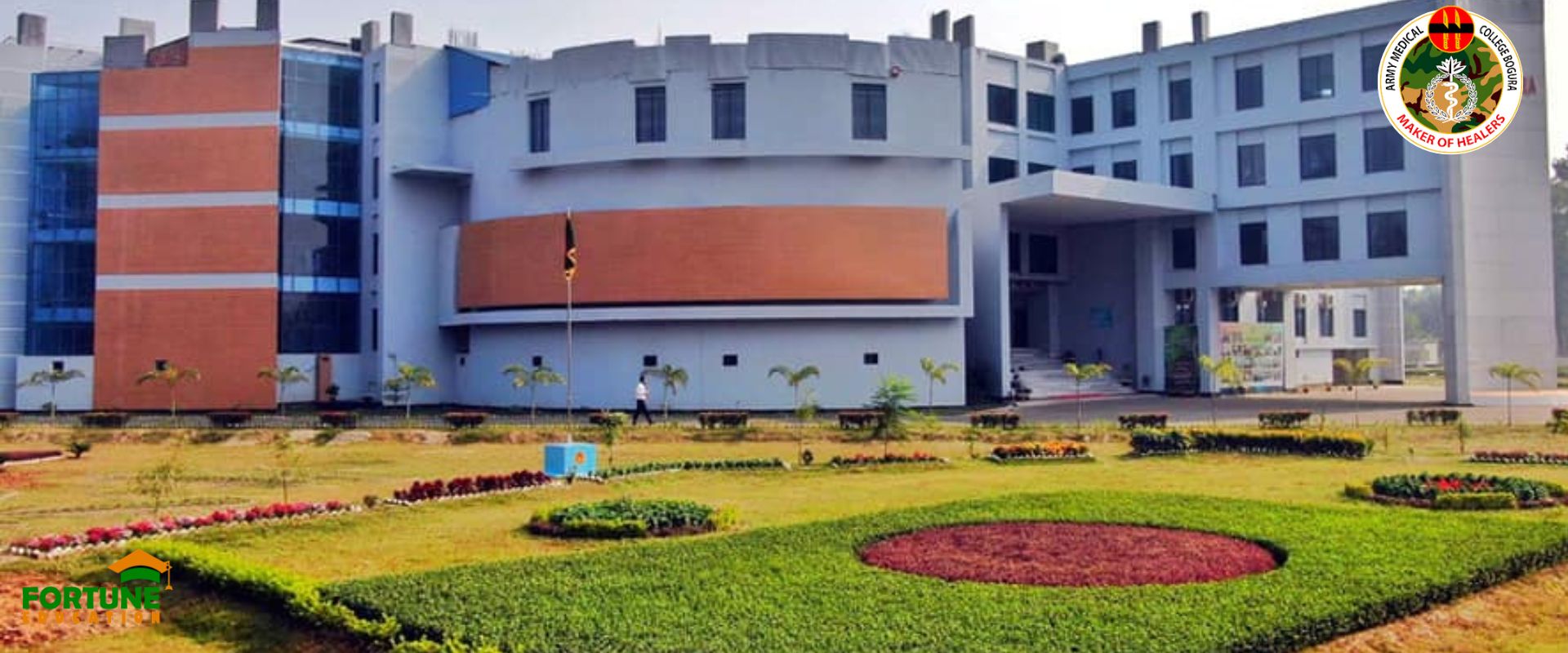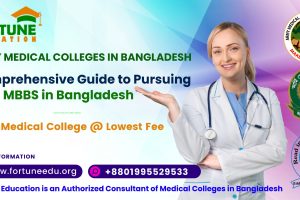
MBBS Scholarship/ Waiver on Private Medical College 2024-25
Online Registration & Application Open
Fortune Education offers MBBS Admission with special scholarship/ Waiver on private medical colleges under various medical universities in Bangladesh for the academic year 2021-22.
MBBS Scholarship/ Waiver on Private Medical College 2024-25
Fortune Education, Dhaka, Bangladesh, established in 2004, is the Pioneer & World Leading Education Consultant. And, an authorized representative of Medical, Dental colleges, and universities all over the world.
Registration & Online Application started in various colleges.
Fortune offers MBBS, BDS & BVSc admission with special scholarships & waivers on the best private medical colleges under (1) University Of Dhaka (2) Chittagong Medical University (3) Rajshahi Medical University (4) Sylhet Medical University.
Fortune Education has local offices providing counseling for Admission, Application, Guidance, Documentation & other required services such as scholarship/Waiver to the eligible students regarding medical and higher studies…
Fortune Education offered special scholarship/waiver up to $10,000 (Ten Thousand) US Dollars as per Merit & Seat availability.
Visit for online application/registration: www.fortuneedu.org
The candidates must check the eligibility criteria before applying through the online Application.
The eligibility criteria for MBBS courses in different disciplines:
- A candidate who has passed 10 + 2 pattern examinations
who have Physics, Chemistry, and Biology as compulsory subjects - Achieved minimum 60% marks,
- Qualified for the NEET Exam, is eligible to pursue an undergraduate degree in MBBS.
- Candidates’ maximum study gap of 2 years accepted after 10+2.
MBBS Admission in Bangladesh 2024-25
Admission to MBBS programs in Bangladesh for the academic year 2024-25 would typically follow a structured process, involving eligibility criteria, application procedures, entrance exams, and selection processes.
Here’s a general overview of what prospective students can expect, based on previous years’ admission processes and regulations as set by the Directorate General of Health Services (DGHS) of Bangladesh and the Bangladesh Medical and Dental Council (BMDC).
Eligibility Criteria
Academic Requirements: Applicants must have completed their Higher Secondary Certificate (HSC) or equivalent, with a focus on science subjects (Physics, Chemistry, Biology).
Grades: A minimum grade requirement in both SSC (Secondary School Certificate) and HSC exams, usually including a specific GPA in science subjects.
Age Limit: There might be an age limit for applicants (e.g., 17 years old by a certain date).
Application Process
Application Form: Interested candidates need to fill out an application form, usually available on the DGHS website or the websites of individual medical colleges.
Submission of Documents: This includes academic transcripts, certificates, and potentially other documents as specified by the admission guidelines.
Entrance Exam
Medical Admission Test: A national medical admission test is typically required for entry into MBBS programs. This test assesses knowledge in science subjects and aptitude for a career in medicine.
Format and Syllabus: The exam format can include multiple-choice questions (MCQs) covering biology, chemistry, physics, English, and
general knowledge.
Selection Process
Merit List: Based on the scores obtained in the entrance exam, a national merit list is prepared. Admission to various medical colleges is offered based on ranking in this list.
Quota System: There might be a quota system in place for certain groups, such as children of freedom fighters, tribal and minority communities, and foreign students.
Foreign Students
Separate Quota: There is usually a separate quota for foreign students, including those from SAARC countries and others.
Admission Process: Foreign students may need to apply through their respective embassies or directly to the colleges if permitted, with eligibility criteria slightly differing from local students.
Tuition Fees and Expenses
Government Colleges: The fees in government medical colleges are relatively lower than in private colleges.
Private Colleges: Tuition fees in private medical colleges can be significantly higher and vary widely among institutions.
Key Dates
Application Period: The application period usually opens a few months before the beginning of the academic year.
Entrance Exam Date: Typically conducted once a year, the exact date should be confirmed from official sources.
Additional Tips
Stay Updated: Regularly check the DGHS website and the websites of individual medical colleges for the latest information on admission processes, dates, and requirements.
Preparation: Start preparing for the entrance exam well in advance, focusing on the syllabus provided by DGHS.
For the most accurate and recent information regarding MBBS admissions in Bangladesh for the academic year 2024-25, it’s crucial to refer to official announcements from the Directorate General of Health Services (DGHS) and the Bangladesh Medical and Dental Council (BMDC).
Army Medical College Jashore
Army Medical College Jashore (AMCJ) in Bangladesh is one of the several Army Medical Colleges established to offer medical education primarily to the children of military personnel, although civilian students can also apply. These institutions aim to produce highly skilled medical graduates who can contribute both to military healthcare services and civilian medical needs. As of my last update, here are some general details about AMCJ:
History and Establishment
Army Medical College Jashore, like its sister institutions, was established as part of a broader initiative to enhance medical education and healthcare services within the Bangladesh Armed Forces and the nation. These colleges operate under the affiliation of the Bangladesh University of Professionals (BUP) and are recognized by the Bangladesh Medical and Dental Council (BMDC).
Admission Process
The admission process for AMCJ is similar to that of other Army Medical Colleges in Bangladesh:
Eligibility Criteria: Candidates must meet specific academic qualifications, typically including high marks in science subjects (Physics, Chemistry, Biology) at the HSC level.
Entrance Exam: Admission is competitive and requires passing an entrance exam that tests knowledge in science subjects, English, and general aptitude for a career in medicine.
Military and Civilian Applicants: While priority may be given to children of military personnel, civilian students are also eligible and encouraged to apply.
Academic Program
The primary degree offered at AMCJ is the Bachelor of Medicine, Bachelor of Surgery (MBBS):
Curriculum: The MBBS program usually spans five years, followed by a one-year internship, which is a requirement for medical graduates in Bangladesh.
Accreditation: The degree is accredited by the BMDC, ensuring that graduates are eligible to practice medicine in Bangladesh and beyond, subject to meeting any additional international certification requirements.
Facilities and Training
Campus and Infrastructure: AMCJ is equipped with modern educational facilities, including lecture halls, laboratories, and libraries.
Clinical Training: Students receive clinical training at affiliated hospitals, providing them with practical experience in patient care.
Career Opportunities
Graduates from AMCJ have various career paths available:
- Military Service: Opportunities to serve as medical officers in the Bangladesh Armed Forces.
- Civilian Practice: Graduates can also enter civilian medical practice, either in Bangladesh or abroad.
Further Education: Graduates may pursue further specialization through postgraduate studies in Bangladesh or internationally.
For the most current information on admission requirements, application deadlines, and program details for Army Medical College Jashore, prospective students should consult the official AMCJ website or contact the college directly.
This ensures access to the latest updates and guidance on how to apply.
Why MBBS SAARC Scholarship in Bangladesh?
The MBBS SAARC Scholarship offered by Bangladesh is part of a broader initiative to foster goodwill, cooperation, and mutual understanding among the member countries of the South Asian Association for Regional Cooperation (SAARC).
This scholarship program is specifically designed for students from SAARC countries (excluding Bangladesh) who wish to pursue a Bachelor of Medicine, Bachelor of Surgery (MBBS) degree in Bangladesh. Here are several reasons why this scholarship is significant and beneficial:
Promoting Regional Cooperation
Cultural Exchange: The scholarship encourages cultural exchange and understanding among SAARC countries, contributing to regional harmony and friendship.
Educational Collaboration: It facilitates educational collaboration and the sharing of knowledge, expertise, and resources in the field of medical education and healthcare.
Enhancing Medical Education
Quality Education: Bangladesh offers quality medical education that is recognized both nationally and internationally, providing students with a solid foundation in the medical field.
Affordable Costs: Even without the scholarship, studying MBBS in Bangladesh is comparatively affordable. The scholarship makes it even more accessible by covering tuition fees and sometimes including a stipend for living expenses.
Building Healthcare Capacities
Addressing Shortages: Many SAARC countries face a shortage of qualified healthcare professionals. The scholarship aims to help address this gap by training doctors who can contribute to their home countries’ healthcare sectors.
Sharing Best Practices: Graduates often return to their home countries with new skills, knowledge, and best practices in healthcare that can be implemented to improve local medical services.
Strengthening Ties
Diplomatic Relations: Educational exchanges like the MBBS SAARC Scholarship program strengthen diplomatic relations between Bangladesh and other SAARC countries.
Mutual Benefits: While scholarship recipients gain quality education and professional skills, Bangladesh benefits from enriching its educational institutions with diverse student bodies and fostering good relations with neighboring countries.
Eligibility and Application
Inclusivity: The scholarship is open to students from all SAARC countries (except Bangladesh), making it inclusive and widely accessible.
Merit-based Selection: Candidates are typically selected based on their academic achievements and potential to contribute to their home country’s healthcare sector, ensuring that the scholarship benefits dedicated and capable students.
Overall, the MBBS SAARC Scholarship in Bangladesh represents a significant investment in the future of healthcare in the South Asian region. It not only provides individual beneficiaries with the opportunity to pursue a medical education but also serves broader goals of regional development, cooperation, and peace-building.
Challenges
The MBBS SAARC Scholarship in Bangladesh, while offering numerous opportunities and benefits, also comes with its set of challenges for both the recipients and the administering bodies.
These challenges can range from cultural adaptation to maintaining high academic standards, among others. Understanding these challenges is crucial for both prospective students and policymakers to enhance the effectiveness of the scholarship program.
Cultural and Linguistic Adaptation
Language Barrier: Even though the medium of instruction is English, daily communication might require understanding of Bengali, leading to initial difficulties for international students.
Cultural Differences: Students from different SAARC countries may find it challenging to adjust to the cultural norms and lifestyle in Bangladesh, affecting their social integration and overall experience.
Academic Rigor and Pressure
Competitive Environment: The academic environment in medical colleges is highly competitive, which can be stressful for scholarship recipients aiming to maintain their scholarship by achieving the required grades.
Curriculum Adjustment: Adapting to a new educational system and curriculum can be challenging, particularly for students who may have completed their previous education under different academic standards.
Quality and Recognition of Medical Education
Variability in Quality: There can be variability in the quality of education and clinical training across different medical colleges in Bangladesh, potentially affecting graduates’ competencies.
International Recognition: While MBBS degrees from Bangladesh are recognized in many countries, graduates may still need to pass additional exams or meet specific criteria to practice medicine in their home countries or elsewhere.
Living Conditions and Infrastructure
Accommodation and Facilities: Finding suitable accommodation or adjusting to the available student housing facilities can be a challenge for some international students.
Infrastructure Constraints: Limited resources and infrastructure in some medical colleges can impact students’ learning experience and access to modern medical equipment and training.
Financial and Administrative Issues
Stipend and Living Expenses: While the scholarship covers tuition fees, the stipend provided may not be sufficient to cover all living expenses, requiring students to seek additional financial support.
Bureaucratic Processes: Navigating the administrative procedures for visas, registration, and other formalities can be cumbersome and time-consuming for international students.
Future Employment and Recognition
Employment Prospects: There may be concerns about employment prospects and the recognition of the MBBS degree from Bangladesh in the students’ home countries.
Licensing Exams: Graduates often need to pass licensing exams in their home countries or in the countries where they wish to practice, which can pose an additional challenge after completing their studies.
Addressing the Challenges
Efforts to address these challenges involve enhancing support services for international students, ensuring the quality and global recognition of the medical education provided, and facilitating smoother administrative processes.
Additionally, providing pre-departure orientations, language support classes, and cultural integration programs can help students adjust more effectively to their new environment.




